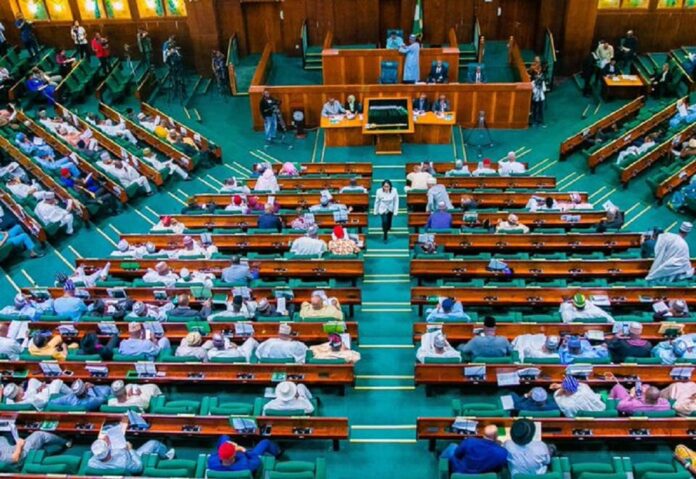Lawmakers Seek Rotational Presidency, Six Years Single Term for President, Govs in Proposed Bills
CHIGOZIE AMADI
A group of over 30 lawmakers in the House of Representatives under the aegis of the Reform Minded Legislators are seeking constitutional alterations to provide for the rotation of executive powers among the six geopolitical zones.
The lawmakers are also seeking to amend the constitution to provide for a single tenure of six years for the President and Governors of the Federal Republic of Nigeria.
This, the lawmakers said would lead to reduction in government spending, eliminate wastage, bring about efficiency in governance and national stability by providing a single term of six years for the President and Governors.
Addressing journalists yesterday, in Abuja, Co-sponsor of the reformers bills and member representing Ideato North/South Federal Constituency, Hon. Ikenga Ugochinyere, said the electoral reform bills have gone through first reading, adding that they would be going for a second reading on the floor of the House.
He said the bills, if passed into law, would help reduce the cost of governance and campaigns, unite the country, ensure a seamless transition, continuity, uninterrupted development, justice, equity, independence of the Independent National Electoral Commission (INEC) and efficient use of state resources, among others.
Ugochinyere explained: “We are a group of Reform minded lawmakers committed towards using the instrument of lawmaking to reform Nigeria and our political process, constitutional and electoral reform has been a burning topic in Nigeria since independence from Britain in 1960.”
He added that this was in line with the realisation that the current political arrangement has some identified distortions, defects and limitations that called for urgent, focused and realistic attention, hence the initiative on political and electoral reform.
Ugochinyere noted: “These bills which are 50 in numbers have gone through first reading but today we are starting with public unveiling of about six of them while the remaining will come in the weeks ahead.
“It ranges from governance, economic, security, and justice sector reforms to social bills that will target unifying our nation and ensuring long-lasting peace and national cohesion.”
The lawmakers stressed that they were cognisant of the fact that Nigeria in times past had deliberated on and accepted some of the proposals in the Bills, including the Justice Uwais electoral reforms, the Senator Ken Nnamani electoral reform committee, the Udoji civil service reform reports, the Confab reports, among others.
Against this background, the lawmakers said they are proposing: “Constitutional Alteration to provide for the rotation of executive powers among the six geopolitical zones to ensure equal representation and reduce the desperation and tempo of agitation for the creation of states.
“To amend section 3 of the Constitution to provide for the recognition of the division of Nigeria into six geopolitical zones.
“To amend the Constitution to provide for a single tenure of six years for the President and Governors of the Federal Republic of Nigeria. The reduction in government spending and wastage, efficiency in governance, and national stability by providing a single term of six years for the President and Governors.”
The lawmakers are also proposing a constitutional amendment to create the office of two vice presidents from the southern and northern parts of Nigeria.
They lawmakers noted that the first vice president shall be a succession vice president, while the second vice president shall be a Minister in charge of the Economy, and both shall be Ministers.
The lawmakers added: “Constitutional Amendment to provide that the President and the 1st Vice President shall come from the same part of the country (north or south) and the 1st Vice President shall become President whenever the President becomes incapacitated, i.e., Vice President (Succession), Vice President (Administration and Economy).
“The financial autonomy and accountability of Local Government Councils by prescribing an independent Consolidated Local Government Council Account solely superintendent by Local Councils and prescribing long-term imprisonment for any misuse of Local Government funds.
“To amend section 162(5) of the 1999 Constitution to provide that where a State Government fails to remit to the Local Government Councils within its jurisdiction (or within the State), the amounts standing to the credit of that Local Government in the allocation from the Federation account, such State Government shall not be entitled to receive a future allocation from the federal government.’
On electoral reforms, the lawmakers are proposing bills to amend the relevant sections of the Electoral Act to ensure that all elections — presidential, governorship, National Assembly, state houses of Assembly, and local governments are held on the same day.
The lawmakers are also proposing amendment to relevant sections of the Electoral Act to provide that no declaration of a winner of an election shall be done by the relevant INEC Officials until such officer has compared the results with the list of accredited voters and ensured that the results to be declared are in tandem with the list of accredited voters and the B-VAS machine or any other electronic device.
They added: “Amend the Electoral Act to provide that any INEC Officer who declares a false result will be liable for civil and criminal action personally brought against him by parties in the elections.
“An Amendment to the Electoral Act to provide that all election-related litigations must be resolved and determined by the Elections Petitions Tribunal, Appeal Courts, etc., before the winners are sworn into the respective elective offices.
“An Amendment of the Electoral Act to make provision for the conduct and conclusion of all elections and election-related litigation within a period of six months before the swearing into office of the validly elected person for the office contested.
“An Amendment of the Electoral Act to provide that all election-related documents and materials must be made available to those who participated in elections and who have reasons to question/petition the elections at the Elections Tribunal.”























